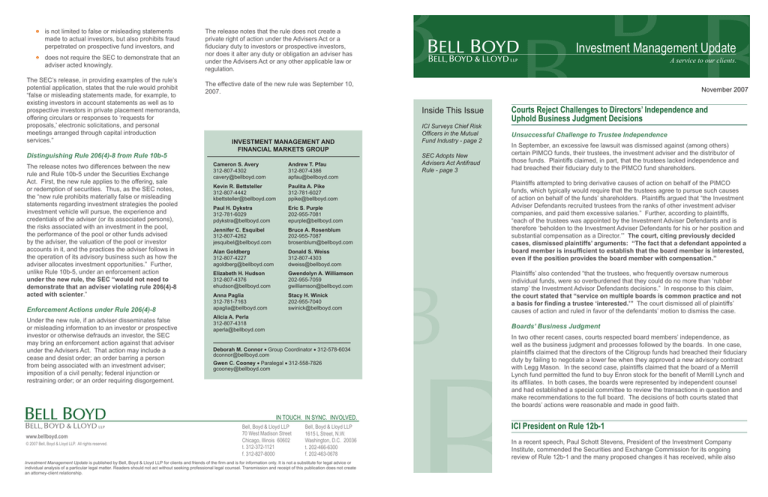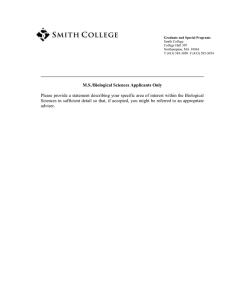
• is not limited to false or misleading statements
made to actual investors, but also prohibits fraud
perpetrated on prospective fund investors, and
• does not require the SEC to demonstrate that an
adviser acted knowingly.
The SEC’s release, in providing examples of the rule’s
potential application, states that the rule would prohibit
“false or misleading statements made, for example, to
existing investors in account statements as well as to
prospective investors in private placement memoranda,
offering circulars or responses to ‘requests for
proposals,’ electronic solicitations, and personal
meetings arranged through capital introduction
services.”
Distinguishing Rule 206(4)-8 from Rule 10b-5
The release notes two differences between the new
rule and Rule 10b-5 under the Securities Exchange
Act. First, the new rule applies to the offering, sale
or redemption of securities. Thus, as the SEC notes,
the “new rule prohibits materially false or misleading
statements regarding investment strategies the pooled
investment vehicle will pursue, the experience and
credentials of the adviser (or its associated persons),
the risks associated with an investment in the pool,
the performance of the pool or other funds advised
by the adviser, the valuation of the pool or investor
accounts in it, and the practices the adviser follows in
the operation of its advisory business such as how the
adviser allocates investment opportunities.” Further,
unlike Rule 10b-5, under an enforcement action
under the new rule, the SEC “would not need to
demonstrate that an adviser violating rule 206(4)-8
acted with scienter.”
Enforcement Actions under Rule 206(4)-8
Under the new rule, if an adviser disseminates false
or misleading information to an investor or prospective
investor or otherwise defrauds an investor, the SEC
may bring an enforcement action against that adviser
under the Advisers Act. That action may include a
cease and desist order; an order barring a person
from being associated with an investment adviser;
imposition of a civil penalty; federal injunction or
restraining order; or an order requiring disgorgement.
The release notes that the rule does not create a
private right of action under the Advisers Act or a
fiduciary duty to investors or prospective investors,
nor does it alter any duty or obligation an adviser has
under the Advisers Act or any other applicable law or
regulation.
© 2007 Bell, Boyd & Lloyd LLP. All rights reserved.
A service to our clients.
The effective date of the new rule was September 10,
2007.
November 2007
Inside This Issue
Investment Management and
financial MARKETS Group
Cameron S. Avery
312-807-4302
cavery@bellboyd.com
Andrew T. Pfau
312-807-4386
apfau@bellboyd.com
Kevin R. Bettsteller
312-807-4442
kbettsteller@bellboyd.com
Paulita A. Pike
312-781-6027
ppike@bellboyd.com
Paul H. Dykstra
312-781-6029
pdykstra@bellboyd.com
Eric S. Purple
202-955-7081
epurple@bellboyd.com
Jennifer C. Esquibel
312-807-4262
jesquibel@bellboyd.com
Bruce A. Rosenblum
202-955-7087
brosenblum@bellboyd.com
Alan Goldberg
312-807-4227
agoldberg@bellboyd.com
Donald S. Weiss
312-807-4303
dweiss@bellboyd.com
Elizabeth H. Hudson
312-807-4376
ehudson@bellboyd.com
Gwendolyn A. Williamson
202-955-7059
gwilliamson@bellboyd.com
Anna Paglia
312-781-7163
apaglia@bellboyd.com
Stacy H. Winick
202-955-7040
swinick@bellboyd.com
Alicia A. Perla
312-807-4318
aperla@bellboyd.com
ICI Surveys Chief Risk
Officers in the Mutual
Fund Industry - page 2
SEC Adopts New
Advisers Act Antifraud
Rule - page 3
Courts Reject Challenges to Directors’ Independence and
Uphold Business Judgment Decisions
Unsuccessful Challenge to Trustee Independence
In September, an excessive fee lawsuit was dismissed against (among others)
certain PIMCO funds, their trustees, the investment adviser and the distributor of
those funds. Plaintiffs claimed, in part, that the trustees lacked independence and
had breached their fiduciary duty to the PIMCO fund shareholders.
Plaintiffs attempted to bring derivative causes of action on behalf of the PIMCO
funds, which typically would require that the trustees agree to pursue such causes
of action on behalf of the funds’ shareholders. Plaintiffs argued that “the Investment
Adviser Defendants recruited trustees from the ranks of other investment adviser
companies, and paid them excessive salaries.” Further, according to plaintiffs,
“each of the trustees was appointed by the Investment Adviser Defendants and is
therefore ‘beholden to the Investment Adviser Defendants for his or her position and
substantial compensation as a Director.’” The court, citing previously decided
cases, dismissed plaintiffs’ arguments: “The fact that a defendant appointed a
board member is insufficient to establish that the board member is interested,
even if the position provides the board member with compensation.”
Plaintiffs’ also contended “that the trustees, who frequently oversaw numerous
individual funds, were so overburdened that they could do no more than ‘rubber
stamp’ the Investment Advisor Defendants decisions.” In response to this claim,
the court stated that “service on multiple boards is common practice and not
a basis for finding a trustee ‘interested.’” The court dismissed all of plaintiffs’
causes of action and ruled in favor of the defendants’ motion to dismiss the case.
Boards’ Business Judgment
Deborah M. Connor • Group Coordinator • 312-578-6034
dconnor@bellboyd.com
Gwen C. Cooney • Paralegal • 312-558-7826
gcooney@bellboyd.com
IN TOUCH. IN SYNC. INVOLVED.
www.bellboyd.com
Investment Management Update
Bell, Boyd & Lloyd LLP
70 West Madison Street
Chicago, Illinois 60602
t. 312-372-1121
f. 312-827-8000
Bell, Boyd & Lloyd LLP
1615 L Street, N.W.
Washington, D.C. 20036
t. 202-466-6300
f. 202-463-0678
Investment Management Update is published by Bell, Boyd & Lloyd LLP for clients and friends of the firm and is for information only. It is not a substitute for legal advice or
individual analysis of a particular legal matter. Readers should not act without seeking professional legal counsel. Transmission and receipt of this publication does not create
an attorney-client relationship.
In two other recent cases, courts respected board members’ independence, as
well as the business judgment and processes followed by the boards. In one case,
plaintiffs claimed that the directors of the Citigroup funds had breached their fiduciary
duty by failing to negotiate a lower fee when they approved a new advisory contract
with Legg Mason. In the second case, plaintiffs claimed that the board of a Merrill
Lynch fund permitted the fund to buy Enron stock for the benefit of Merrill Lynch and
its affiliates. In both cases, the boards were represented by independent counsel
and had established a special committee to review the transactions in question and
make recommendations to the full board. The decisions of both courts stated that
the boards’ actions were reasonable and made in good faith.
ICI President on Rule 12b-1
In a recent speech, Paul Schott Stevens, President of the Investment Company
Institute, commended the Securities and Exchange Commission for its ongoing
review of Rule 12b-1 and the many proposed changes it has received, while also
Investment Management Update
ICI Surveys Chief Risk Officers in the Mutual
Fund Industry
urging “a rigorous analysis of the need for, nature
of and likely impact of any proposed changes.” He
addressed several of the suggestions made by
reform proponents, including:
The ICI’s Risk Management Advisory Committee
recently conducted 20 in-depth, one-on-one
interviews of fund Chief Risk Officers to determine
CROs’ roles within mutual fund organizations. The
participants surveyed in the interviews were members
of the Committee, which released a white paper at the
beginning of August on the results of its inquiry.
• Eliminating or further limiting 12b-1 fees:
Mr. Stevens commented that “this is a false
hope. The ‘do-it-yourself’ fund buyers who prefer
to make investment decisions on their own are
a distinct minority.” According to Mr. Stevens,
Rule 12b-1 allows the typical investor, who
purchases fund shares through intermediaries
that provide a menu of services to customers,
“[to] pay over time for the bundle of valuable
services they receive, rather than doing so
through sales charges at the time of purchase.”
Mr. Stevens noted that “the costs that
investors incur under Rule 12b-1 would not
disappear if the rule did, they simply would
migrate elsewhere.”
Creation of a CRO Position
The white paper notes that many fund companies
do not have a CRO position, but those that do
tend to be larger complexes that also have an
Internal Auditor and Chief Legal Officer. Additionally,
many banking institutions and insurance companies
have established the position of CRO in response
to regulators’ interest in having a highly experienced
senior manager oversee such organizations’ internal
controls.
• Imposing 12b-1 fees at the shareholder
account level: Mr. Stevens challenged the
notion that 12b-1 fees are hidden and remarked,
“If 12b-1 fees are hidden, they are hiding in
plain sight: They occupy a prominent place in
the fee table that is enshrined in the risk-return
summary at the front of every fund prospectus.”
The existence of foreign subsidiaries is another
factor that may influence an organization’s
decision to create a CRO position. For example,
organizations in the UK are subject to regulation by
the Financial Services Authority, which expects a
company’s overall compliance and control procedures
to include effective operational risk management.
• Improving disclosure of 12b-1 fees:
Mr. Stevens agreed that communicating in
“plain English” would be advantageous in
helping investors to understand these fees and
commented that “[t]he term ‘12b-1’ is likely
about as clear to a financial novice as ‘ERA’
is to someone who’s never seen a baseball
game. Rule 12b-1 fees deserve a new name
and associated disclosure that clearly conveys
their purpose.”
For those mutual fund organizations that do have a
CRO, the position is often relatively new to the
organization. However, the survey found that most
individuals serving as fund CROs are not new to the
industry, as most have at least 15 years of experience
in the financial services industry. In fact, many fund
CROs are not new to the fund organization, either:
60% of CROs surveyed were hired from another part of
the company.
• Clarifying the role of fund boards:
Mr. Stevens commented on the need for an
annual review of the roles and responsibilities
of fund boards and stressed that, “[e]specially in
light of the role now played by chief compliance
officers of funds, such review should be an
annual exercise, freeing up time at fund
board meetings for other matters.”
Survey participants indicated that, in addition to having
a background in the financial services industry, some
of the qualities that made them effective as CROs
included having good communication skills, sound
business judgment and the abilities to facilitate and
collaborate.
Mr. Stevens concluded that “the Commission should
recognize that the rule, for all the ways it might be
improved, is basically a success story – for the
fund industry and, more importantly, for investors.”
CRO Responsibilities
The survey found that overseeing operational risk is
the primary focus for most CROs. Other core CRO
responsibilities include:
2
• creation and communication of risk management
that the decision in Goldstein v. SEC “created some
uncertainly regarding the application of sections 206(1)
and 206(2).” The Goldstein opinion stated that, in
determining the meaning of “client” as used in Section
203(b)(3) of the Advisers Act, the term, for purposes of
Sections 206(1) and (2), includes a pooled investment
vehicle but not an investor in such a pool. As a result,
the rule’s release states, “it was unclear whether the
Commission could continue to rely on sections 206(1)
and (2) of the Advisers Act to bring enforcement
actions in certain cases where investors in a pool are
defrauded by an investment adviser to that pool.” The
new rule is thus intended to clarify that “an investment
adviser’s duty to refrain from fraudulent conduct
under the federal securities laws extends to the
relationship with ultimate investors and that the
Commission may bring enforcement actions under the
Advisers Act against investment advisers who defraud
investors or prospective investors in those pooled
investment vehicles.”
policies,
• review and evaluation of a fund’s risk
management processes,
• designing controls to measure and monitor risk,
• provision of techniques, training and guidance to
help managers identify, analyze, and respond to
risks, and
• advocating risk management as an
organizational policy.
A majority (60%) of the survey participants also held
more than one position within their organizations.
The Evolving Role of CRO
Although both the specific responsibilities of
CROs and their places within organizations vary,
the great majority (80%) of the CROs surveyed
reported that the CRO position was effective within
their organizations. This may be related to the survey’s
finding that the CRO function within most organizations
has evolved over time, which may indicate that the
role of CRO is shaped by each organization to fit its
particular needs.
New Rule 206(4)-8
The new rule expressly prohibits any fraudulent,
deceptive or manipulative act, practice or course
of business of any investment adviser of a pooled
investment vehicle who:
• makes any untrue statement of a material fact
SEC Adopts New Advisers Act Antifraud
Rule
or omits stating a material fact necessary to
make the statements made, in the light of the
circumstances under which they were made,
not misleading, to any investor or prospective
investor in the pooled investment vehicle, or
The SEC recently adopted Rule 206(4)-8 under
the Investment Advisers Act, to allow it to bring
enforcement actions against advisers to “pooled
investment vehicles” that make false or misleading
statements to their investors or prospective
investors, or otherwise defraud their investors or
prospective investors. The rule applies to both
registered and unregistered advisers that advise
“pooled investment vehicles,” which includes hedge
funds, private equity funds, venture capital funds, and
other types of privately offered pools that invest in
securities, as well as investment companies registered
under the Investment Company Act.
• otherwise engages in any act, practice or
course of business that is fraudulent, deceptive
or manipulative with respect to any investor or
prospective investor in the pooled investment
vehicle.
Scope of Rule 206(4)-8
It is noteworthy that the new rule:
• applies to any pooled investment vehicle
adviser, including an adviser not registered or
required to be registered under the Advisers Act,
regardless of the pool’s investment strategy or
structure,
Confusion Following Philip Goldstein Decision
In the past, the SEC has brought enforcement actions
against investment advisers under Sections 206(1) and
(2) of the Advisers Act for alleged false and misleading
statements to investors in hedge funds or other
pooled investment vehicles (including mutual funds).
In the new rule’s release, however, the SEC notes
• is not limited to fraud in connection with the
purchase and sale of a security, but also applies
to the offering, sale or redemption of fund
securities,
3
Investment Management Update
ICI Surveys Chief Risk Officers in the Mutual
Fund Industry
urging “a rigorous analysis of the need for, nature
of and likely impact of any proposed changes.” He
addressed several of the suggestions made by
reform proponents, including:
The ICI’s Risk Management Advisory Committee
recently conducted 20 in-depth, one-on-one
interviews of fund Chief Risk Officers to determine
CROs’ roles within mutual fund organizations. The
participants surveyed in the interviews were members
of the Committee, which released a white paper at the
beginning of August on the results of its inquiry.
• Eliminating or further limiting 12b-1 fees:
Mr. Stevens commented that “this is a false
hope. The ‘do-it-yourself’ fund buyers who prefer
to make investment decisions on their own are
a distinct minority.” According to Mr. Stevens,
Rule 12b-1 allows the typical investor, who
purchases fund shares through intermediaries
that provide a menu of services to customers,
“[to] pay over time for the bundle of valuable
services they receive, rather than doing so
through sales charges at the time of purchase.”
Mr. Stevens noted that “the costs that
investors incur under Rule 12b-1 would not
disappear if the rule did, they simply would
migrate elsewhere.”
Creation of a CRO Position
The white paper notes that many fund companies
do not have a CRO position, but those that do
tend to be larger complexes that also have an
Internal Auditor and Chief Legal Officer. Additionally,
many banking institutions and insurance companies
have established the position of CRO in response
to regulators’ interest in having a highly experienced
senior manager oversee such organizations’ internal
controls.
• Imposing 12b-1 fees at the shareholder
account level: Mr. Stevens challenged the
notion that 12b-1 fees are hidden and remarked,
“If 12b-1 fees are hidden, they are hiding in
plain sight: They occupy a prominent place in
the fee table that is enshrined in the risk-return
summary at the front of every fund prospectus.”
The existence of foreign subsidiaries is another
factor that may influence an organization’s
decision to create a CRO position. For example,
organizations in the UK are subject to regulation by
the Financial Services Authority, which expects a
company’s overall compliance and control procedures
to include effective operational risk management.
• Improving disclosure of 12b-1 fees:
Mr. Stevens agreed that communicating in
“plain English” would be advantageous in
helping investors to understand these fees and
commented that “[t]he term ‘12b-1’ is likely
about as clear to a financial novice as ‘ERA’
is to someone who’s never seen a baseball
game. Rule 12b-1 fees deserve a new name
and associated disclosure that clearly conveys
their purpose.”
For those mutual fund organizations that do have a
CRO, the position is often relatively new to the
organization. However, the survey found that most
individuals serving as fund CROs are not new to the
industry, as most have at least 15 years of experience
in the financial services industry. In fact, many fund
CROs are not new to the fund organization, either:
60% of CROs surveyed were hired from another part of
the company.
• Clarifying the role of fund boards:
Mr. Stevens commented on the need for an
annual review of the roles and responsibilities
of fund boards and stressed that, “[e]specially in
light of the role now played by chief compliance
officers of funds, such review should be an
annual exercise, freeing up time at fund
board meetings for other matters.”
Survey participants indicated that, in addition to having
a background in the financial services industry, some
of the qualities that made them effective as CROs
included having good communication skills, sound
business judgment and the abilities to facilitate and
collaborate.
Mr. Stevens concluded that “the Commission should
recognize that the rule, for all the ways it might be
improved, is basically a success story – for the
fund industry and, more importantly, for investors.”
CRO Responsibilities
The survey found that overseeing operational risk is
the primary focus for most CROs. Other core CRO
responsibilities include:
2
• creation and communication of risk management
that the decision in Goldstein v. SEC “created some
uncertainly regarding the application of sections 206(1)
and 206(2).” The Goldstein opinion stated that, in
determining the meaning of “client” as used in Section
203(b)(3) of the Advisers Act, the term, for purposes of
Sections 206(1) and (2), includes a pooled investment
vehicle but not an investor in such a pool. As a result,
the rule’s release states, “it was unclear whether the
Commission could continue to rely on sections 206(1)
and (2) of the Advisers Act to bring enforcement
actions in certain cases where investors in a pool are
defrauded by an investment adviser to that pool.” The
new rule is thus intended to clarify that “an investment
adviser’s duty to refrain from fraudulent conduct
under the federal securities laws extends to the
relationship with ultimate investors and that the
Commission may bring enforcement actions under the
Advisers Act against investment advisers who defraud
investors or prospective investors in those pooled
investment vehicles.”
policies,
• review and evaluation of a fund’s risk
management processes,
• designing controls to measure and monitor risk,
• provision of techniques, training and guidance to
help managers identify, analyze, and respond to
risks, and
• advocating risk management as an
organizational policy.
A majority (60%) of the survey participants also held
more than one position within their organizations.
The Evolving Role of CRO
Although both the specific responsibilities of
CROs and their places within organizations vary,
the great majority (80%) of the CROs surveyed
reported that the CRO position was effective within
their organizations. This may be related to the survey’s
finding that the CRO function within most organizations
has evolved over time, which may indicate that the
role of CRO is shaped by each organization to fit its
particular needs.
New Rule 206(4)-8
The new rule expressly prohibits any fraudulent,
deceptive or manipulative act, practice or course
of business of any investment adviser of a pooled
investment vehicle who:
• makes any untrue statement of a material fact
SEC Adopts New Advisers Act Antifraud
Rule
or omits stating a material fact necessary to
make the statements made, in the light of the
circumstances under which they were made,
not misleading, to any investor or prospective
investor in the pooled investment vehicle, or
The SEC recently adopted Rule 206(4)-8 under
the Investment Advisers Act, to allow it to bring
enforcement actions against advisers to “pooled
investment vehicles” that make false or misleading
statements to their investors or prospective
investors, or otherwise defraud their investors or
prospective investors. The rule applies to both
registered and unregistered advisers that advise
“pooled investment vehicles,” which includes hedge
funds, private equity funds, venture capital funds, and
other types of privately offered pools that invest in
securities, as well as investment companies registered
under the Investment Company Act.
• otherwise engages in any act, practice or
course of business that is fraudulent, deceptive
or manipulative with respect to any investor or
prospective investor in the pooled investment
vehicle.
Scope of Rule 206(4)-8
It is noteworthy that the new rule:
• applies to any pooled investment vehicle
adviser, including an adviser not registered or
required to be registered under the Advisers Act,
regardless of the pool’s investment strategy or
structure,
Confusion Following Philip Goldstein Decision
In the past, the SEC has brought enforcement actions
against investment advisers under Sections 206(1) and
(2) of the Advisers Act for alleged false and misleading
statements to investors in hedge funds or other
pooled investment vehicles (including mutual funds).
In the new rule’s release, however, the SEC notes
• is not limited to fraud in connection with the
purchase and sale of a security, but also applies
to the offering, sale or redemption of fund
securities,
3
• is not limited to false or misleading statements
made to actual investors, but also prohibits fraud
perpetrated on prospective fund investors, and
• does not require the SEC to demonstrate that an
adviser acted knowingly.
The SEC’s release, in providing examples of the rule’s
potential application, states that the rule would prohibit
“false or misleading statements made, for example, to
existing investors in account statements as well as to
prospective investors in private placement memoranda,
offering circulars or responses to ‘requests for
proposals,’ electronic solicitations, and personal
meetings arranged through capital introduction
services.”
Distinguishing Rule 206(4)-8 from Rule 10b-5
The release notes two differences between the new
rule and Rule 10b-5 under the Securities Exchange
Act. First, the new rule applies to the offering, sale
or redemption of securities. Thus, as the SEC notes,
the “new rule prohibits materially false or misleading
statements regarding investment strategies the pooled
investment vehicle will pursue, the experience and
credentials of the adviser (or its associated persons),
the risks associated with an investment in the pool,
the performance of the pool or other funds advised
by the adviser, the valuation of the pool or investor
accounts in it, and the practices the adviser follows in
the operation of its advisory business such as how the
adviser allocates investment opportunities.” Further,
unlike Rule 10b-5, under an enforcement action
under the new rule, the SEC “would not need to
demonstrate that an adviser violating rule 206(4)-8
acted with scienter.”
Enforcement Actions under Rule 206(4)-8
Under the new rule, if an adviser disseminates false
or misleading information to an investor or prospective
investor or otherwise defrauds an investor, the SEC
may bring an enforcement action against that adviser
under the Advisers Act. That action may include a
cease and desist order; an order barring a person
from being associated with an investment adviser;
imposition of a civil penalty; federal injunction or
restraining order; or an order requiring disgorgement.
The release notes that the rule does not create a
private right of action under the Advisers Act or a
fiduciary duty to investors or prospective investors,
nor does it alter any duty or obligation an adviser has
under the Advisers Act or any other applicable law or
regulation.
© 2007 Bell, Boyd & Lloyd LLP. All rights reserved.
A service to our clients.
The effective date of the new rule was September 10,
2007.
November 2007
Inside This Issue
Investment Management and
financial MARKETS Group
Cameron S. Avery
312-807-4302
cavery@bellboyd.com
Andrew T. Pfau
312-807-4386
apfau@bellboyd.com
Kevin R. Bettsteller
312-807-4442
kbettsteller@bellboyd.com
Paulita A. Pike
312-781-6027
ppike@bellboyd.com
Paul H. Dykstra
312-781-6029
pdykstra@bellboyd.com
Eric S. Purple
202-955-7081
epurple@bellboyd.com
Jennifer C. Esquibel
312-807-4262
jesquibel@bellboyd.com
Bruce A. Rosenblum
202-955-7087
brosenblum@bellboyd.com
Alan Goldberg
312-807-4227
agoldberg@bellboyd.com
Donald S. Weiss
312-807-4303
dweiss@bellboyd.com
Elizabeth H. Hudson
312-807-4376
ehudson@bellboyd.com
Gwendolyn A. Williamson
202-955-7059
gwilliamson@bellboyd.com
Anna Paglia
312-781-7163
apaglia@bellboyd.com
Stacy H. Winick
202-955-7040
swinick@bellboyd.com
Alicia A. Perla
312-807-4318
aperla@bellboyd.com
ICI Surveys Chief Risk
Officers in the Mutual
Fund Industry - page 2
SEC Adopts New
Advisers Act Antifraud
Rule - page 3
Courts Reject Challenges to Directors’ Independence and
Uphold Business Judgment Decisions
Unsuccessful Challenge to Trustee Independence
In September, an excessive fee lawsuit was dismissed against (among others)
certain PIMCO funds, their trustees, the investment adviser and the distributor of
those funds. Plaintiffs claimed, in part, that the trustees lacked independence and
had breached their fiduciary duty to the PIMCO fund shareholders.
Plaintiffs attempted to bring derivative causes of action on behalf of the PIMCO
funds, which typically would require that the trustees agree to pursue such causes
of action on behalf of the funds’ shareholders. Plaintiffs argued that “the Investment
Adviser Defendants recruited trustees from the ranks of other investment adviser
companies, and paid them excessive salaries.” Further, according to plaintiffs,
“each of the trustees was appointed by the Investment Adviser Defendants and is
therefore ‘beholden to the Investment Adviser Defendants for his or her position and
substantial compensation as a Director.’” The court, citing previously decided
cases, dismissed plaintiffs’ arguments: “The fact that a defendant appointed a
board member is insufficient to establish that the board member is interested,
even if the position provides the board member with compensation.”
Plaintiffs’ also contended “that the trustees, who frequently oversaw numerous
individual funds, were so overburdened that they could do no more than ‘rubber
stamp’ the Investment Advisor Defendants decisions.” In response to this claim,
the court stated that “service on multiple boards is common practice and not
a basis for finding a trustee ‘interested.’” The court dismissed all of plaintiffs’
causes of action and ruled in favor of the defendants’ motion to dismiss the case.
Boards’ Business Judgment
Deborah M. Connor • Group Coordinator • 312-578-6034
dconnor@bellboyd.com
Gwen C. Cooney • Paralegal • 312-558-7826
gcooney@bellboyd.com
IN TOUCH. IN SYNC. INVOLVED.
www.bellboyd.com
Investment Management Update
Bell, Boyd & Lloyd LLP
70 West Madison Street
Chicago, Illinois 60602
t. 312-372-1121
f. 312-827-8000
Bell, Boyd & Lloyd LLP
1615 L Street, N.W.
Washington, D.C. 20036
t. 202-466-6300
f. 202-463-0678
Investment Management Update is published by Bell, Boyd & Lloyd LLP for clients and friends of the firm and is for information only. It is not a substitute for legal advice or
individual analysis of a particular legal matter. Readers should not act without seeking professional legal counsel. Transmission and receipt of this publication does not create
an attorney-client relationship.
In two other recent cases, courts respected board members’ independence, as
well as the business judgment and processes followed by the boards. In one case,
plaintiffs claimed that the directors of the Citigroup funds had breached their fiduciary
duty by failing to negotiate a lower fee when they approved a new advisory contract
with Legg Mason. In the second case, plaintiffs claimed that the board of a Merrill
Lynch fund permitted the fund to buy Enron stock for the benefit of Merrill Lynch and
its affiliates. In both cases, the boards were represented by independent counsel
and had established a special committee to review the transactions in question and
make recommendations to the full board. The decisions of both courts stated that
the boards’ actions were reasonable and made in good faith.
ICI President on Rule 12b-1
In a recent speech, Paul Schott Stevens, President of the Investment Company
Institute, commended the Securities and Exchange Commission for its ongoing
review of Rule 12b-1 and the many proposed changes it has received, while also







